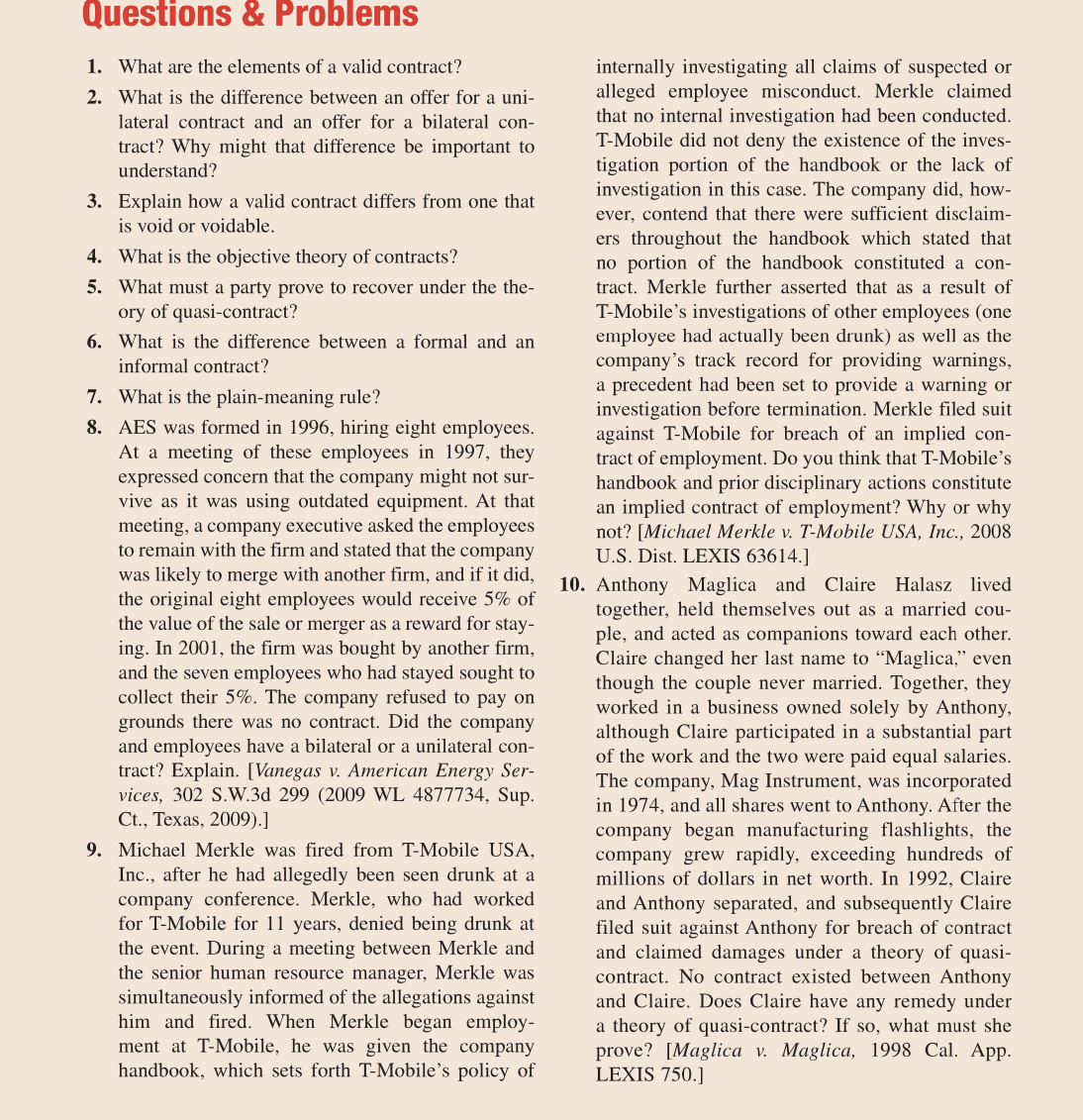Questions 8: Problems 1. 2. 7. 8. What are the elements of a valid contract? What is the difference between an offer for a uni- lateral contract and an offer for a bilateral con- tract? Why might that difference be important to understand? Explain how a valid contract differs from one that is void or voidable. What is the objective theory of contracts? What must a party prove to recover under the the ory of quasi-contract? What is the difference between a formal and an informal contract? What is the plainmeaning rule? AES was formed in 1996, hiring eight employees. At a meeting of these employees in 1997, they expressed concern that the company might not sur- vive as it was using outdated equipment. At that meeting, a company executive asked the employees to remain with the firm and stated that the company was likely to merge with another rm, and if it did, the original eight employees would receive 5% of the value of the sale or merger as a reward for stay- ing. In 2001, the rm was bought by another firm, and the seven employees who had stayed sought to collect their 5%. The company refused to pay on grounds there was no contract. Did the company and employees have a bilateral or a unilateral con- tract? Explain. [Vanegas v. American Energy Ser- vices, 302 S.W.3d 299 (2009 WL 4877734, Sup. CL, Texas, 2009).] Michael Merkle was red from T-Mobile USA, Inc., after he had allegedly been seen drunk at a company conference. Merkle, who had worked for T-Mobile for 11 years, denied being drunk at the event. During a meeting between Merkle and the senior human resource manager, Merkle was simultaneously informed of the allegations against him and red. When Merkle began employ- ment at TMobile, he was given the company handbook, which sets forth TMobile's policy of internally investigating all claims of suspected or alleged employee misconduct. Merkle claimed that no internal investigation had been conducted. T-Mobile did not deny the existence of the inves- tigation portion of the handbook or the lack of investigation in this case. The company did, how- ever, contend that there were sufcient disclaim ers throughout the handbook which stated that no portion of the handbook constituted a con- tract. Merkle further asserted that as a result of T-Mobile's investigations of other employees (one employee had actually been drunk) as well as the company's track record for providing warnings, a precedent had been set to provide a warning or investigation before termination. Merkle filed suit against TMobile for breach of an implied con tract of employment. Do you think that T-Mobile's handbook and prior disciplinary actions constitute an implied contract of employment? Why or why not? [Michael Merkle v. T~Mobie USA, Inc., 2008 11.8. Dist. LEXIS 63614.] . Anthony Maglica and Claire Halasz lived together, held themselves out as a married cou- ple, and acted as companions toward each other. Claire changed her last name to \"Maglica,\" even though the couple never married. Together, they worked in a business owned solely by Anthony, although Claire participated in a substantial part of the work and the two were paid equal salaries. The company, Mag Instrument, was incorporated in 1974, and all shares went to Anthony. After the company began manufacturing ashlights, the company grew rapidly, exceeding hundreds of milEions of dollars in net worth. In 1992, Claire and Anthony separated, and subsequently Claire led suit against Anthony for breach of contract and claimed damages under a theory of quasi- contract. No contract existed between Anthony and Claire. Does Claire have any remedy under a theory of quasi~contract? If so, what must she prove? [Magtfca v. Magtica, 1993 Cal. App. LEXIS ?50.]







